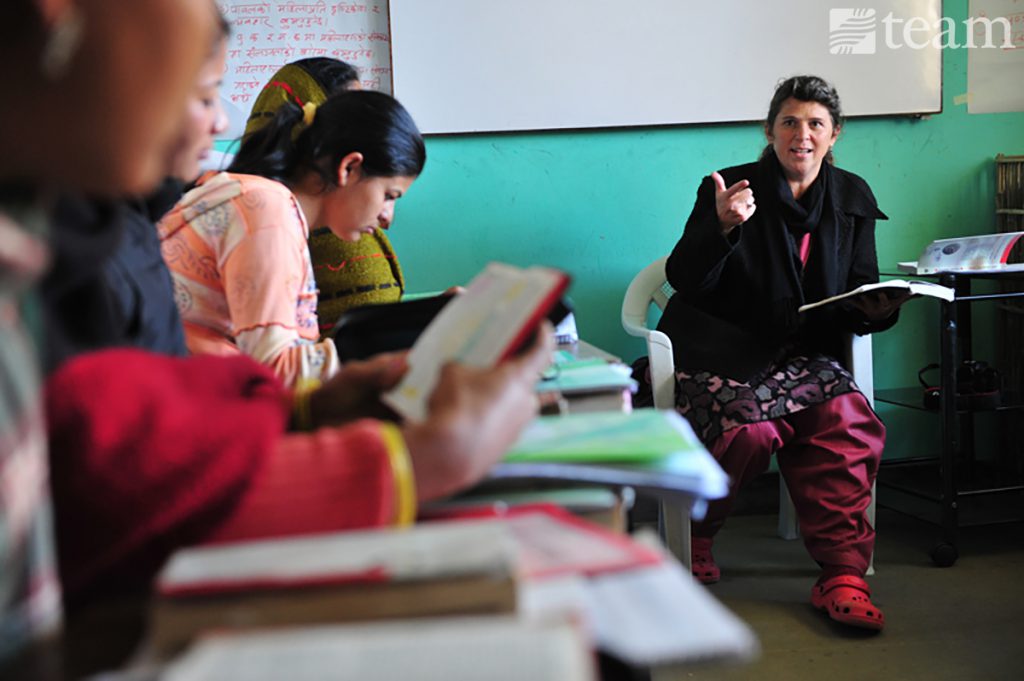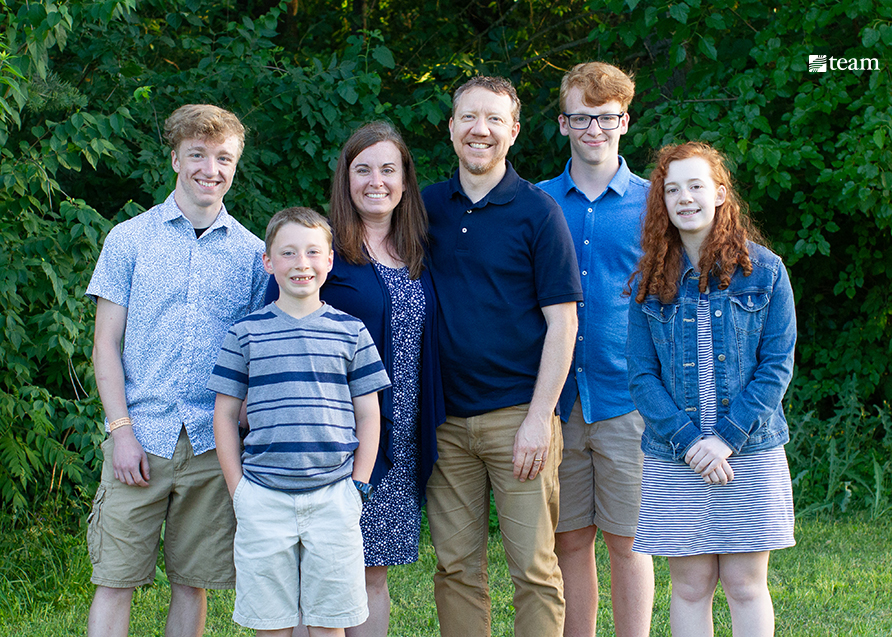
Becoming a Missionary
How Do You Know You’re Called to Missions?
August 18, 2016
by admin

How can you know you’re called to missions? Especially when the very concept of “calling” can seem vague, mysterious and even painstaking to figure out?
Sure, it’s nuanced. But confidently knowing your missionary calling is not impossible, either. Read six workers’ unique testimonies of how God called them to serve.
Open Doors

Scott and Susan Downing were determined not to become missionaries. But God led them to a place of surrender.
“Our calling to missions started by Susan and I both saying that we would never be missionaries, and that kind of got God’s ear,” says Scott Downing, a worker in Chad.
Scott and Susan both grew up as missionary kids in Africa but never considered a life of missions for themselves. It was through a devotional study by Henry Blackaby that God began to challenge the Downings to surrender these plans.
“Henry Blackaby asks in the devotional, ‘When was the last time that you heard God speak?’ And neither of us could answer that. … That kind of sent us on a journey, and everywhere we went, all we heard was, ‘Surrender to full-time, faith-based missions.’
In obedience, the Downings reached out to missions agencies and received information from TEAM about Chad. Scott says, “[The report] was pretty doom and gloom, you know. Dark. You’re stranded. You’re flooded out in the rainy season. There’s no food. It’s 120 degrees. And we were really excited about that!
“So we pursued [Chad], and we told God, ‘We’re pretty ignorant. If this isn’t your will, you’re going to have to slam doors in our face and not just close them gently. We’re moving forward for Chad, and if you don’t like that, please show us. And 11 years later, he keeps opening doors.”
Homesick for an Unknown Home

A challenging short-term experience pushed Roberta Peabody to understand God in a new way. By the end of her trip, she was ready to serve in Japan full-time.
Roberta Peabody met her first missionary when her pastor’s brother, a Christian worker in Japan, visited her congregation. He later invited Roberta on her first short-term mission trip to teach English in a Japanese church.
“I remember very clearly, it was a very difficult summer because I was in the big city, and it was hot. And I went thinking I was so proud of myself because I was going, but then, I couldn’t communicate! I didn’t speak a word of Japanese.”
To bridge the language divide, Roberta had a translator to help lead her English class. One day, she asked the translator to pray with her before class. Roberta was deeply homesick, physically sick and overwhelmed by her inability to communicate. As they prayed, each in their own language, Roberta had a revelation.
“As a young Christian, that was the first time that I really got it that God understood both of us — without any confusion, without any need for translation. So I returned home from Japan, homesick for Japan.”
God continued to confirm Roberta’s calling to Japan, and she has found her home and ministry there for over 25 years.
Trading Small Ambitions

Brent Preston loved growing up as a missionary kid in Papua, but that didn’t mean he was going to follow in his parents’ footsteps.
Brent Preston grew up in what he calls, “a young guy’s paradise.” Brent’s parents served as missionaries in the jungles of Papua, and he fondly recalls days of fishing and hunting and water skiing on mile-wide rivers.
Less fondly, he remembers tough financial times and the hand-me-down clothes he had to wear to boarding school. He says, “I hated wearing clothing that was out of style, so I thought, ‘You know, I [love] what my parents did, but I [am] going to be a rich Christian.’”
So Brent pursued his education in the United States — sights set on affording the lifestyle his missionary parents never could.
At a graduation ceremony, Brent observed something peculiar to him: “The president of the school was given a new suit by the graduating class. And I thought, ‘Why is this guy being given a new suit? Can’t he buy his own suits? He’s the president! He gets the best wage on campus!’”
Later, Brent discovered the president of his university bought his clothing at thrift stores so he could give more money to missions. “The very clothing that I didn’t want to wear, he wore on purpose,” Brent says. He realized, “This guy is living for eternity, and I am not.”
Brent noticed that for many of his classmates, missions was off the table due to fears of travel, other cultures or unfamiliar foods. He remembers thinking, “I don’t fear any of that. … I’m not afraid of foreign foods. I’m not afraid to learn another language. I’ve been away from home my whole life. Why shouldn’t I go?”
“So I gave up my small ambitions. … I was nineteen years old, and I decided to be a missionary.”
Short-Term Trip, Long-Term Vision

Seeing God worshiped in other cultures on a short-term mission trip gave Hannah long-term vision for the nations.
When Hannah went on her first short-term mission trip in high school, her worldview changed. As she experienced life and worship in a new place, she began to see how God worked in other cultures outside of her own. This stirred in Hannah a zeal to give her life to what God is doing around the world.
Hannah then went on to live out her missions calling in North America by serving as TEAM’s manager of short-term ministry. Annually, Hannah and her team send over 100 short-term missionaries to contribute to the global church.
Hannah says, “Being a part of that sending process is what excites me. It’s so much more than our individual stories. It’s how God is weaving together the world and other people and cultures. I love being able to see how he’s using so many people to demonstrate that and to be an extension of the church everywhere.”
Gradual Understanding

Sally Kauffman can’t tell you the exact moment God called her to be a missionary to Japan. “It was just a slow, steady understanding,” she says.
Six months into Sally Kauffman’s short-term mission trip, she was homesick, experiencing culture shock and desiring to go home. But as she continued in ministry, God called her to missions — gradually.
“In my case, it wasn’t just like a knock on the head or anything like that, but … over the course of two years, the Lord just kept impressing on my heart, day after day, ‘You’ve been given so much. You need to share.’ It was just that simple. … So it was just a slow, steady understanding in my case.”
More than three decades later, Sally is still sharing the gift of Christ with the people of Japan.
A Dream Come True

Becky Martin knew as a small child that she wanted to be a missionary. Finally leaving for the mission field was a dream come true.
“God’s unique in the way he deals with each of us, and … I really wanted to be in missions from the time I was a little kid. By the time I finally, 28 years ago, left for [South Asia], it was like a dream come true in a lot of ways for me,” says Becky Martin, a worker in South Asia.
Becky grew up in a family and local church where she says, “Missions was just part of being a Christian.” So she pursued a degree in nursing with the intention of using her skills on the mission field.
Regarding her decision to serve in South Asia, Becky says, “It was a process.” She began by choosing a sending agency, TEAM. Then, she looked for a country where physical and spiritual needs were great. A country in South Asia fit the criteria.
Nearly three decades later, Becky continues to see God confirm the missionary calling He gave her as a girl.
Is God calling you to be a missionary? Check out “Why Your Call to Missions Matters + How to Find It” for further reading.
And when you’re ready, TEAM missions coaches are eager to talk and pray with you as you discern your next steps. Connect with a missions coach here.
Related articles


